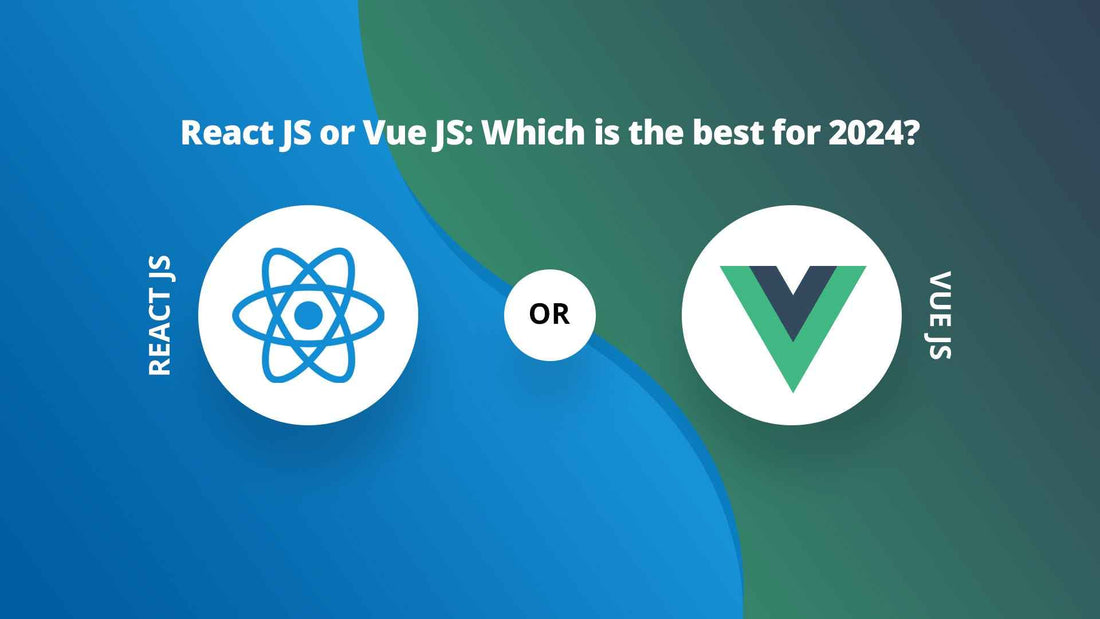
React JS or Vue JS: Which is the Best for 2024?
Share
In the dynamic world of web development, React JS and Vue JS are two leading frontend frameworks that developers turn to for building high-performance, scalable, and interactive user interfaces. As we move into 2024, the debate continues over which framework is better suited for modern web projects. Both React and Vue have their own strengths and are backed by strong communities, but when choosing one for your next project, several factors need to be considered. Let’s dive into a detailed comparison to help you make an informed decision in 2024.
- Overview: React JS and Vue JS
React JS, developed and maintained by Facebook, has been around since 2013. It's renowned for its flexibility and component-based architecture, making it highly suitable for building complex, interactive user interfaces. It has a vast ecosystem with various tools and libraries supporting its core framework.
Vue JS, created by ex-Google engineer Evan You in 2014, is often described as more beginner-friendly. It provides an approachable syntax and is praised for its versatility, especially in smaller, more agile projects. Vue is perfect for developers who want a more structured framework with a balance of performance and simplicity.
- Popularity and Market Trends
In 2024, React continues to hold the crown in terms of popularity. According to the latest Stack Overflow Developer Survey, React is the most-used frontend framework globally, powering thousands of websites and applications, including Facebook, Instagram, and Airbnb. With a huge community, continuous updates, and vast resources, React remains the go-to choice for many companies.
Vue, on the other hand, has also seen tremendous growth, particularly among smaller teams and startups. With its lightweight architecture, Vue is becoming increasingly popular in regions like Asia and Europe, where developers appreciate its simplicity and ease of integration. Vue powers apps such as Alibaba, Xiaomi, and Grammarly, proving its strength in building high-performance applications.
- Learning Curve
For beginners entering the world of frontend development in 2024, Vue JS offers a much smoother learning curve. Its syntax is intuitive, with built-in state management (Vuex) and routing (Vue Router) available out of the box. Even developers with minimal experience in JavaScript can quickly pick up Vue and start building projects.
React JS, while powerful, requires a deeper understanding of JavaScript concepts such as JSX, virtual DOM, and state management through tools like Redux or React Context. Although the React community provides a plethora of learning resources, new developers may find the learning curve steeper compared to Vue.
- Performance
When it comes to performance, both React and Vue are highly optimized for speed and efficiency. Both frameworks use the virtual DOM to improve rendering performance by updating only parts of the UI that change rather than reloading the entire page.
However, React has a slight edge in handling extremely large applications with complex user interfaces. Its well-established ecosystem and integration with tools like Next.js allow developers to optimize server-side rendering (SSR) and client-side performance.
Vue’s smaller footprint makes it a preferred choice for lightweight applications where performance is key, but without the need for extensive scalability.
- Ecosystem and Flexibility
React JS boasts a mature and extensive ecosystem. It is highly unopinionated, allowing developers to choose from a variety of tools for state management, routing, testing, and more. While this flexibility is great for experienced developers, it can be overwhelming for beginners who may be unsure which libraries to integrate into their projects.
Vue JS comes with a more opinionated approach. Many of its tools are officially maintained by Vue’s core team, including Vue Router, Vuex for state management, and the Vue CLI for project scaffolding. This structured approach makes Vue less overwhelming and easier to adopt for teams looking to get started quickly without extensive setup.
- Community and Job Market
React continues to dominate in terms of community size and job opportunities. As of 2024, many top-tier companies list React as a key requirement for frontend developer roles. The active community means that developers can find solutions to almost any issue and access countless tutorials, libraries, and third-party tools.
Vue has a smaller but very passionate community. While the job market for Vue developers is not as vast as React’s, it is steadily growing. Companies that prioritize simplicity and faster development cycles often opt for Vue, leading to increased demand for Vue developers, especially in the startup scene.
- When to Choose React JS in 2024
- If you are building a large-scale application that requires a high level of flexibility, scalability, and a rich ecosystem of third-party tools.
- When you need advanced SSR (Server-Side Rendering) and integration with frameworks like Next.js for better performance and SEO.
- If you’re working on a team that is already familiar with React or needs to maintain a long-term project with extensive community support and updates.
- When to Choose Vue JS in 2024
- If you want a faster development cycle with a minimal learning curve, especially for small to medium-sized applications.
- When your project requires a lightweight framework with a simpler integration process and fewer third-party dependencies.
- If you are working in regions or industries where Vue is more commonly used or need to transition quickly from older frontend frameworks.
Conclusion: React or Vue in 2024?
Ultimately, choosing between React and Vue in 2024 comes down to your specific project needs. React remains the heavyweight champion for enterprise-level applications due to its robust ecosystem, performance optimizations, and vast community support. Vue, however, excels in simplicity and agility, making it ideal for smaller teams and projects where ease of use is a priority.
Whether you’re a startup or a large enterprise, the right choice depends on your development goals, team expertise, and the complexity of your application. Both frameworks have proven to be reliable options that will continue to dominate the web development space in 2024.
By evaluating your project requirements, learning curve, and team structure, you can decide whether React or Vue is the best fit for your next big project. No matter which you choose, both frameworks are well-positioned to help you succeed in the evolving web development landscape.
